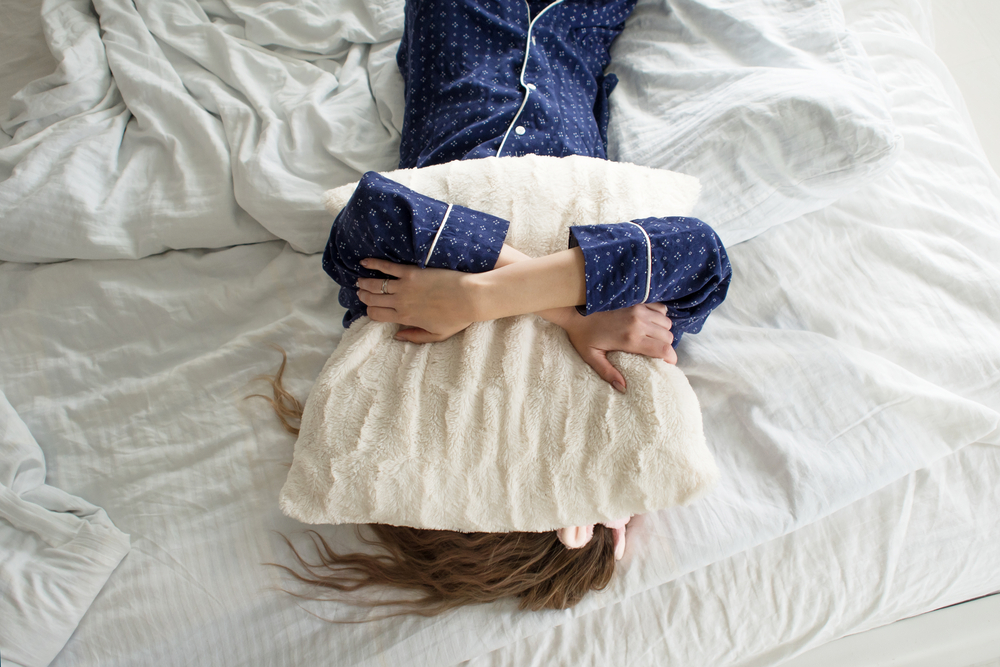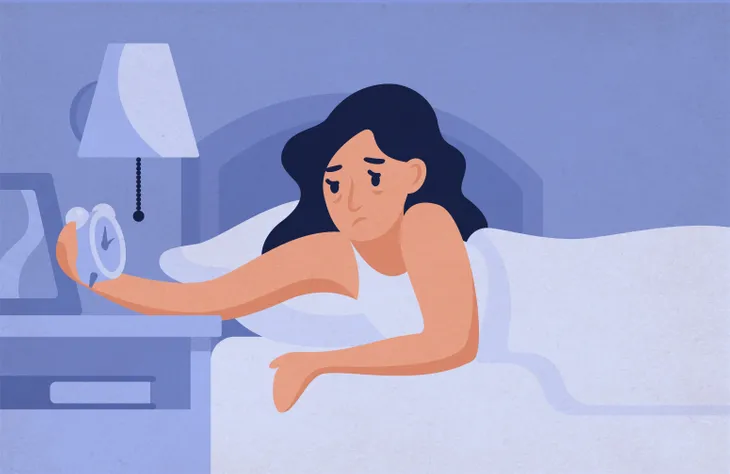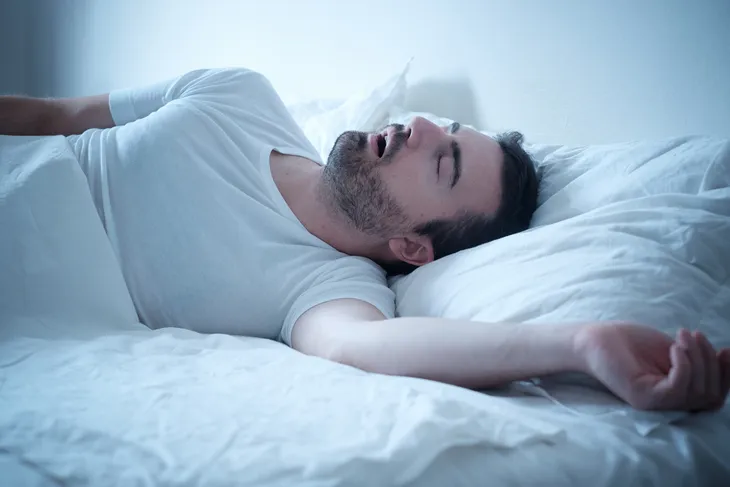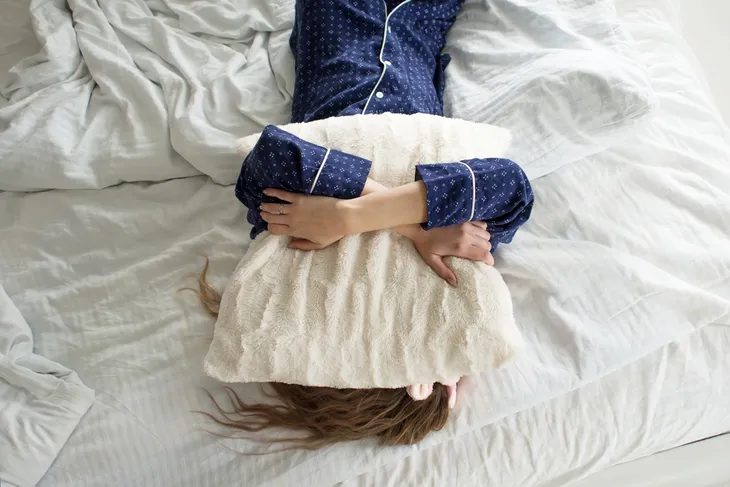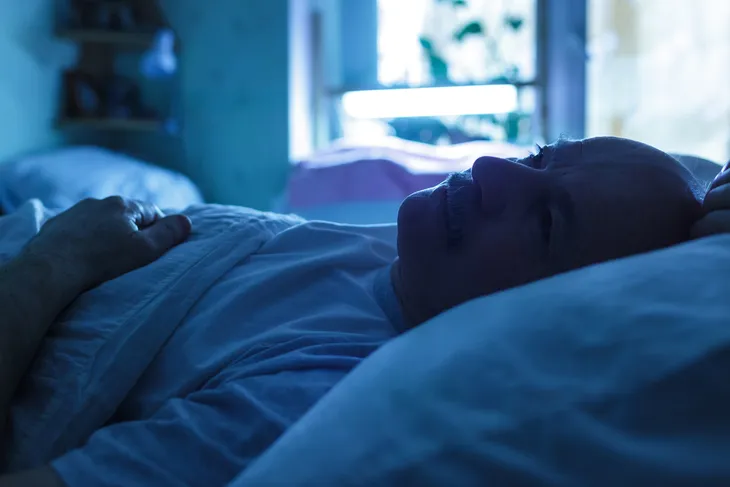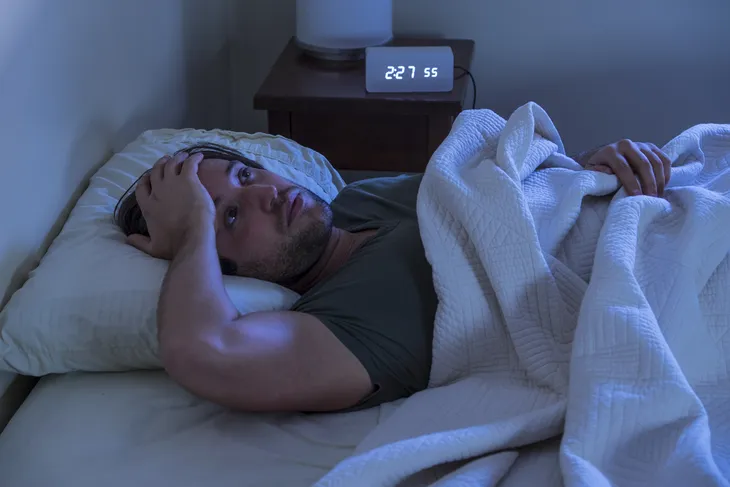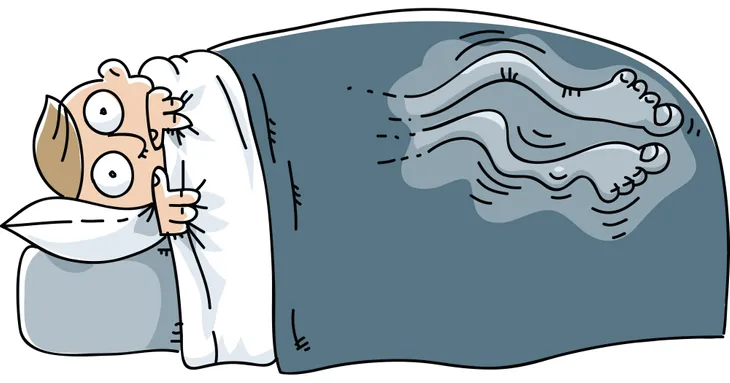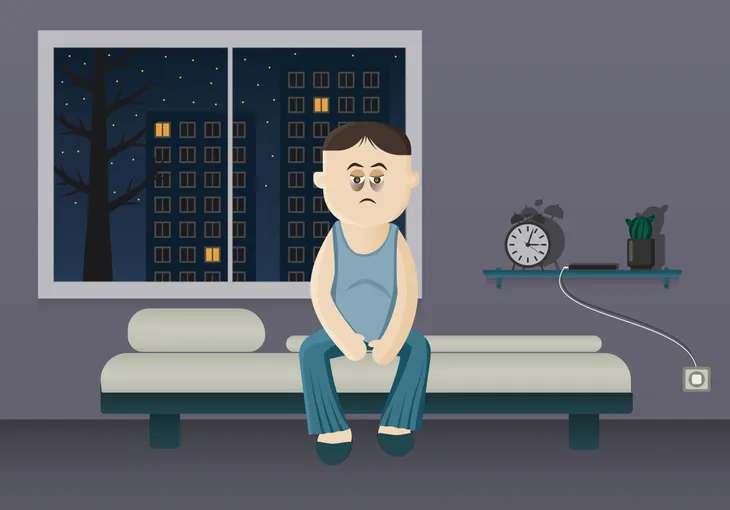We’ve all been there before, lying awake at night, tossing and turning, wondering why you’re unable to sleep. Sometimes the reason is something obvious, like that evening cup of coffee or a midday nap, but other times it’s seemingly for no reason! This can be extremely frustrating, particularly if it’s happening on a frequent basis.
There are so many factors in our daily life that can affect whether or not we’re able to fall asleep or the quality of our sleep, like whether we sleep through the night without waking up. If you’re someone who struggles with getting a good night’s sleep, check out this article which will explore all the potential reasons for waking up in the night…
Anxiety
Anxiety is something we’ve all experienced before on some level. Of course, there are varying degrees of anxiety and for some, it’s more frequent and debilitating to their everyday life. The Mayo Clinic notes that trouble sleeping is one of the most common symptoms of anxiety disorder. This condition can greatly affect sleeping by causing a racing heartbeat and/or night terrors. “Additionally, there are people who may experience what are called nocturnal panic attacks, meaning they may have transient episodes of intense panic that wake them up from their slumber,” says Dr. Okeke-Igbokwe to SELF.
If you think your lack of sleep is due to anxiety, you should consult with a doctor to determine if there is an underlying anxiety disorder at play. A doctor can also provide suggestions for treatment options, such as meditation or breathing exercises.
Drinking
Some people use alcohol as a means to help them sleep, but it actually has the opposite effect. While it might make some of us a little sleepier, myself included, it has a huge impact on our quality of sleep. It causes what SELF refers to it as “fitful sleep.” This means that alcohol causes people to wake up more easily in the second half of their sleep.
This one is tricky because as SELF notes, the way we metabolize alcohol depends on many different factors like genetics, diet and body size, so it’s different for everyone. Alexea Gaffney Adams, MD, a board-certified internist at Stony Brook Medicine recommends people stop drinking at least 3-hours before they go to bed. This gives their body more time to process the alcohol. You should also drink plenty of water.
Another factor that comes into play with drinking is that you’re more likely to have to wake up in the night to go to the washroom which will also interrupt sleep.
Vitamin D Deficiency
Our body needs essential vitamins to function properly, this is why someone who lacks the proper amount of vitamin D may be losing sleep over it. Research from 2011 found that 40-percent of American adults are deficient in vitamin D. This can lead to a slew of health problems including cardiovascular disease, cancer, weak bones, and poor sleep.
Prevention cites research from the Harvard School of Public Health which “found that 12-percent of people with low levels of vitamin D slept for less than 5 hours a night, and 57-percent were awake for 90 or more minutes in the middle of the night,” writes the source. Michael Breus, PhD, clinical psychologist and diplomate of the American Board of Sleep Medicine told Prevention that this is because vitamin D affects the part of our brain that controls sleep.
Sleep Apnea
Sleep apnea is a common culprit behind lack of sleep. This condition causes people to wake up in the night or experience shallow breathing throughout the night. While you might think that you’d know if you had sleep apnea, most people actually don’t even realize that their sleep is being interrupted.
If you notice that you’re constantly drowsy during the day, even after a seemingly restful sleep, it could be due to sleep apnea. You should also look for the following symptoms, “snoring, gasping for air while sleeping, morning headaches, [or] loss of concentration during the day,” says Healthline.
In order to be diagnosed with sleep apnea, you’ll have to get a referral from your doctor to go to a sleep center where your sleep will be monitored.
Overactive Thyroid
This butterfly shaped gland located in the front of the neck is responsible for almost all the metabolic processes in the body. “This gland controls the function of several other organs,” says Alexea Gaffney Adams, MD, a board-certified internist at Stony Brook Medicine to SELF. Because the thyroid plays such an important role in the body’s functioning, when it doesn’t work properly, it can cause an array of problems.
Hyperthyroidism, also referred to as an overactive thyroid, occurs when the thyroid creates too much of the hormone thyroxine, says the Mayo Clinic. “Common symptoms of an overactive thyroid include trouble sleeping, an increased heart rate, sweating (including at night), anxiety, tremors, and more,” writes SELF.
To determine whether or not your thyroid is to blame for any of your sleep troubles, visit your doctor or an endocrinologist (a doctor who specializes in hormones). These healthcare professionals can perform a blood test that will evaluate hormone levels to determine if you have an overactive thyroid.
Age
There are lots of things that change with age — sleep is one of them. We all have some kind of biological clock that is built into us, telling us when we’re tired and when it’s time to wake up in the morning. Prevention explains that around the age of 40, this internal clock begins to shift.
“Researchers aren’t sure exactly why this happens, but the result is that your body will naturally wake up increasingly earlier, decreasing the amount of sleep you’re getting,” says Hans Van Dongen, PhD, director of the Sleep and Performance Research Center at Washington State University when talking to the source. Once a person reaches their 60s, their clock could change by as much as two hours.
To accommodate this new sleep schedule, Prevention suggests going to bed earlier. “You’re probably naturally getting tired earlier, but it’s easy to ignore or not notice the sleepiness if you’re used to staying up late,” says Van Dongen. “Most older people find that when they start getting into bed earlier, they fall asleep easily.”
Excess Belly Fat
Living with excess belly fat can create all kinds of problems for someone’s health, including their ability to sleep soundly. According to Prevention, excess belly fat or fat around the midsection can make it more difficult to breathe when lying down. (FYI: this would be an amount of excess belly fat that has the ability to do this. We’re not talking those extra five pounds you gained on vacation!) “Belly fat can also trigger higher levels of inflammation in your body that disrupt the neurological pathways that control sleep,” explains the source.
Excess belly fat and lack of sleep are so intertwined because research has shown that a lack of sleep is also what causes people to crave unhealthy foods and to overeat the following day. It can cause a person to eat an extra 385 calories! This contributes to more weight gain, thus creating a vicious cycle.
Nocturia
There’s nothing worse than waking up from a wonderful deep sleep because of a full bladder. While this is often an unavoidable side effect of pregnancy, it can also be a frequent problem for those who aren’t pregnant. It’s actually a condition called nocturia and can be caused by a number of different things including diabetes, an enlarged prostate, and overactive bladder, or bladder prolapse, says Healthline.
“Finding out what is causing your need to pee at night is the best way to find the right treatment.” Healthline suggests treating nocturia at home by taking medications earlier in the day, limiting fluid intake in the two to four hours before bed, limit the amount of spicy food before bed, and to try some kegel exercises.
Eating Before Bed
You’ve probably heard before that eating before bed isn’t the best idea, particularly if you’re trying to watch your weight. But there’s another reason that eating before bed isn’t a smart idea, it can cause you to wake up unexpectedly. “Eating too heavy of a meal too close to bedtime can make it difficult to fall asleep or stay asleep,” says Rita Aouad, MD, a sleep medicine physician at The Ohio State University Wexner Medical Center to SELF. The source notes that eating this late can lead to acid reflux which occurs when the acid in our stomach moves up the throat and causes heartburn. Eating before bed also makes a person gassy which can lead to abdominal pain that could interrupt their slumber.
On the other hand, you don’t want to put too much time between sleep and your last meal because this can also create trouble when it comes to sleep, says Aouad. We all know what happens when our stomach is hungry — it growls and cramps. “Hunger could also mess with your blood sugar while you sleep, especially if you have diabetes,” writes SELF. “Going too long without eating can provoke hypoglycemia, which is when your blood sugar drops too low.” According to the Cleveland Clinic, hunger can also cause a restless sleep, in addition to weakness, shaking, dizziness, and confusion. Anyone can become hypoglycemic, but it’s more likely to happen to someone who is diabetic.
Insomnia
Not surprisingly, insomnia can wake a person up at night because this sleep disorder causes people to have trouble falling asleep and staying asleep. “Some people experience insomnia only occasionally, but for others, it’s a chronic problem,” notes Healthline. “Insomnia makes it difficult to get through the day.” People who suffer from this condition are often moody, tired, and have difficulty concentrating.
This disorder is often caused by stress, medication, caffeine, and some medical conditions. Luckily there are a number of things that you can try to help with sleep. Healthline suggests sticking to a sleep schedule, avoid napping during the day, create a treatment plan, get lots of exercise during the day, don’t eat large meals before bed, get out of bed when you can’t sleep, try yoga, melatonin or acupuncture. You can also try cognitive behavioral therapy (CBT).
You’re a Caregiver
Anyone who has experienced taking care of a sick family member or friend knows that it’s incredibly stressful, time consuming, and just overall draining. Because of this stress, it often disrupts the caregivers ability to sleep. Prevention cites research from the Current Sleep Medicine Reports which found that 76-percent of caregivers suffer from poor sleep quality and that it is more often an issue among female caregivers, who greatly outnumber the amount of male caregivers.
The reason behind this is because female caregivers spend approximately 50-percent more time providing care than male caregivers do. Researchers believe “there may be a threshold of time beyond which the likelihood of health consequences — including poor sleep — escalates,” writes the source. Plus, no matter what their gender is, “being a caregiver is tough on your mental health,” says Katherine Sharkey, MD, PhD, assistant dean for women in medicine and science at Brown University Alpert Medical School to Prevention.
Restless Leg Syndrome
Have you ever laid down to sleep at night and had this uncomfortable sensation tugging at your legs? If so, it was probably restless legs syndrome (RLS). The National Institute of Neurological Disorders and Stroke (NINDS) says RLS can cause strange sensations in the legs like throbbing, itching, aching, pulling, crawling which creates this irresistible urge to move the legs. The reason RLS keeps people awake at night or wakes them up in the night is because it’s more likely to occur in the evening or nighttime and gets worse with inactivity like sleep.
While experts aren’t completely sure what causes RLS, NINDS says it seems to be hereditary and could be related to low iron levels, end-stage renal disease and hemodialysis, certain medications, the use of alcohol, nicotine or caffeine, pregnancy, or nerve damage. “Researchers are also investigating how issues with dopamine, a neurotransmitter your muscles need to work correctly, may cause RLS,” writes SELF. “Sometimes there are other underlying issues bringing about RLS as well, such as iron deficiency.”
Anyone who is diagnosed with restless leg syndrome may be prescribed medication by their doctor to treat the condition. SELF explains that these medications may either be used to increase dopamine levels or it could include muscle relaxants. A doctor might also prescribe some at-home remedies to help relieve the symptoms, such as a warm bath to soothe the muscles.
Acid Reflux
Anyone who suffers from acid reflux on a regular basis probably finds that it disrupts their sleep from time to time. This condition causes the acid in our stomach to come back up our esophagus which leads to heartburn. “With heartburn, the discomfort wakes you up. But even if you don’t feel a burning sensation, the acid in your esophagus triggers a muscular reflex to clear it, which can disrupt sleep,” says David Johnson, MD, a professor of medicine and chief of gastroenterology at Eastern Virginia Medical School when talking to Prevention.
The source notes that people with chronic acid reflux are twice more as likely to have sleep problems than the average person.
You’re On Your Phone Too Much
Most people are using their phone right up until their head hits the pillow. It’s often the first thing we check in the morning and the last thing we check before bed. This is not good. “Exposing eyes to light during the evening stops the body from making melatonin, the sleep hormone,” says Richard L. Hansler, PhD, of the Lighting Innovations Institute at John Carroll University in Ohio to Prevention.
We should try to limit the time we spend on our phone, tablets, and basically any electronic device that constitutes as light sources which we hold close to our face before bed. All of these items are potential sleep disturbers. If you’re having trouble falling or staying asleep, try dimming the lights before bed. Studies have found that the blue light from our phone is one of the worst things for sleep. You can also dim the light on your phone and if you must use it, be sure to hold it at least a foot or two from your face.
You’re Too Hot
We’ve all been there before, most likely on a hot summer night, tossing and turning unable to fall asleep. Many people do not have air conditioning on those warm summer months which makes sleeping a little more difficult.
Warm temperatures can also cause night sweats. “With night sweats, you frequently wake up in the middle of the night drenched in sweat,” writes Healthline. “They can have a number of causes, such as medications, anxiety, [and] autoimmune disorders.” If you find that you’re waking up on a regular basis due to night sweats or overheating, talk to your doctor about potential causes. While it may be due to the warm weather, there could be other reasons behind it.
If it’s a result of a warm environment, Healthline suggests sleeping downstairs instead of upstairs. You can also use a fan to cool down your room or keep blinds closed during the day to block the heat from the sun. Also, be sure to wear light clothing to bed and swap the heavy duvet for a light blanket.
